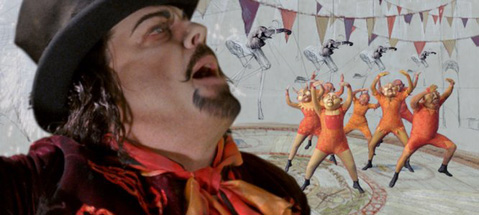Movie Review: Across the Universe
By Matthew Huntley
September 25, 2007
BoxOfficeProphets.com

Across the Universe, the exhilarating new film from Julie Taymor (the director behind Frida and Titus) doesn't tell us anything we don't already know about its era. In fact, I wondered why Taymor, who has a unique and vibrant style unlike any other current filmmaker, chose to focus on things like the Vietnam War and rock 'n roll when they've been the subject of countless other movies.
But then it dawned on me: "Across the Universe" doesn't care about educating us. It knows its audience is already familiar with its subjects and themes. Instead of teaching us, it sets out to present the '60s in a new and vibrant way, perhaps as a way to remind us of what made that time so special and influential.
Taymor's narrative is constantly moving even though, at its heart, it's a traditional love story. But it's a deeply felt one and it falls within a greater body of themes that include war, artistic expression, family, radicalism and young people finding themselves among the chaos of the turbulent decade. It's kind of like an experimental, musical version of TV's The Wonder Years.
At the beginning, a young Englishman sits on a deserted beach and asks us to listen to his story. This is Jude (John Sturgess), who's about 18 when he bids farewell to his life as a dock worker in Liverpool and sets sail for America. Unbeknownst to his mother, Jude's real reason for leaving is to find his American father at Princeton University. It's here where he meets Max (Joe Anderson), a long-haired, freethinking dreamer who's not cut out for the Ivy League lifestyle.
Max introduces Jude to his younger sister Lucy (Evan Rachel Wood), a responsible, all-American girl whose boyfriend has just gone off to fight in Vietnam. Jude almost immediately falls in love with Lucy, but before you know it, he and Max spontaneously take off for New York City, since, according to Max, it's "what any irresponsible, unmotivated dropout would do."
Tragic circumstances prompt Lucy to join them and a love blossoms between her and Jude. We also witness the major historical events unfold as Lucy joins the anti-war movement, Max gets drafted, and Jude, living as an illegal immigrant, finds he can get by on love and drawing. They all move in with Sadie (Dana Fuchs), a small-time rock diva on the verge of a bigger music career, and are later joined by JoJo (Martin Luther McCoy), a guitarist who's younger brother's death in the riots urged him to leave his hometown, and Prudence ( T.V. Carpio), a lesbian whose sexuality has made her feel like a black sheep in the conservative state of Ohio.
All five of these characters more or less represent various movements or iconic figures of the time: Lucy is the outspoken and determined anti-war activist; Jude and Max relish in irresponsibility and the burgeoning hippie generation; Sadie seems like she could be a Janis Joplin-type; JoJo resembles Jimmy Hendrix; and Prudence is a pioneer of women's liberation.
Taymor puts them all into a musical predominantly featuring Beatles songs, which, in hindsight, feels like the perfect and only choice. John Lennon and Paul McCartney's timeless lyrics (sung by modern singers in the film) reflect the characters feelings and experiences as they seek ways to find and express themselves. The movie is not high art, nor is it particularly subtle, but it's got an energy and style that give it substance beyond a technical exercise.
Even besides its original and provocative methods, what makes Across the Universe work is its living, breathing characters. Each is heroic and flawed in his or her own way. They're interesting and charming and we like them, which illustrates why Rent, whose characters lacked a cinematic depth (they probably worked better on Broadway), failed as a movie adaptation.
Ultimately, there are two main things going on in Across the Universe: the characters and the historical events. On one level, we become infatuated with these young people and their experiences. On another, we soak in the history and atmosphere. Both aspects are handled well by Taymor and each could have succeeded on their own. Through mesmerizing production design, colorful special effects, and impressionistic dance and song numbers, Taymor gives the movie a weight and originality that make it thrive.
I didn't learn anything new by watching Across the Universe. Again, Taymor's intention is not to give her audience a history lesson but to provide us with a unique experience that uses the Vietnam War as a backdrop. I was engaged for its entire two hours and ten minutes, even during its more abstract and experimental scenes, which included a blatant drug trip led by Dr. Richard (played by U2's Bono).
It would have been interesting to see Taymor's style applied to current events, or perhaps something different than Vietnam. After all, the Vietnam era has become so indoctrinated in artistic culture that it's given rise to expectations and conventions. But Across the Universe works because it reminds us why it's important for art and love to thrive in moments of crisis and confusion, when the world doesn't make much sense. I know how idealistic and simplified that sounds, but that's sometimes how it really is.